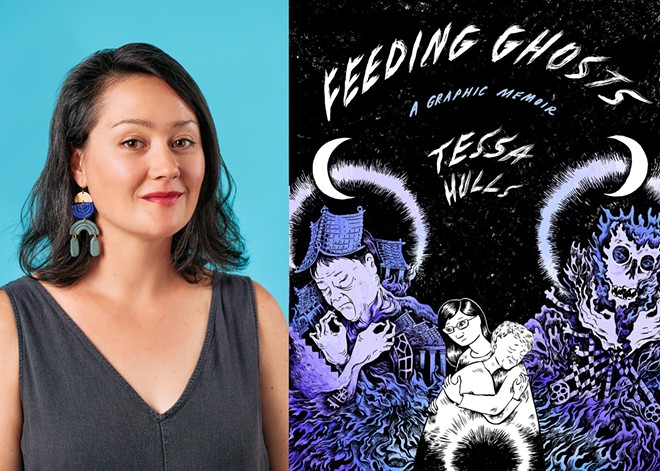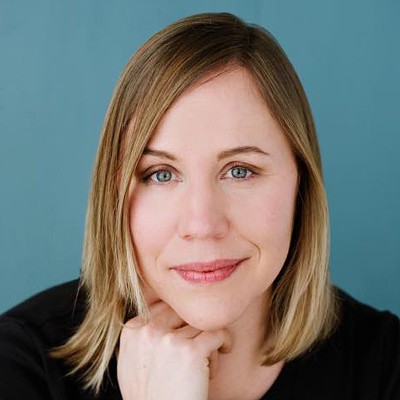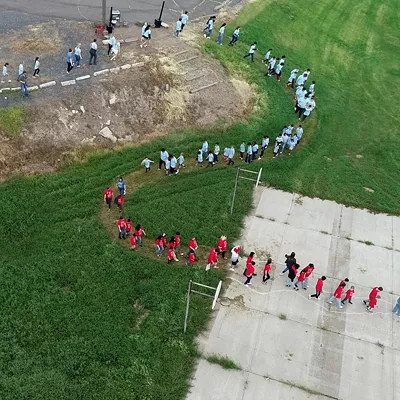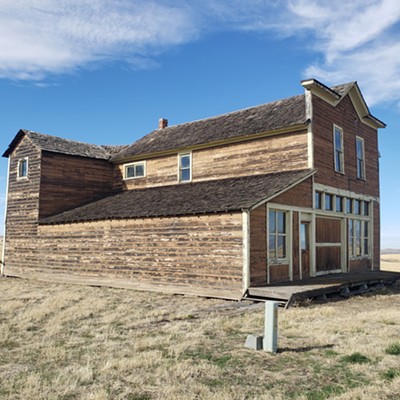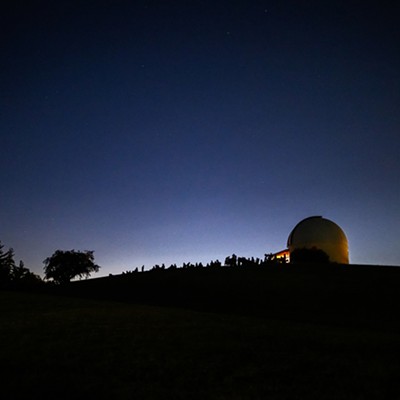Tessa Hulls remembers exactly where she was when she realized she had to create her graphic memoir Feeding Ghosts.
It was February 2015, and the Seattle-based author and artist was biking up a mountain in Mexico. Hulls was talking to herself, as one is wont to do while biking mile after mile alone.
"'This chapter of basically being an American and living for my own freedom has come to an end. What comes next?'" Hulls recalls asking herself, reflecting on a decade spent globetrotting from California to Antarctica to Ghana and everywhere in between. "The landscape literally told me, 'Someone has to feed the ghosts.' Then I spent the next nine years doing that."
The ghosts in question surround Hulls' grandmother, Sun Yi, and mother, Rose.
Sun Yi was a journalist in Shanghai who faced persecution because of her criticisms of the communist government. Sun Yi smuggled herself and Rose, then 7 years old, to Hong Kong beneath the false bottom of a fishing boat.
In Hong Kong, Sun Yi wrote a memoir, Eight Years in Red Shanghai: Love, Starvation, Persecution. The money from the book paid for Rose's boarding school education. Sun Yi then had a mental breakdown and was institutionalized. Practically raised by the teachers at her boarding school, Rose eventually received a scholarship to study in America and brought her mother with her when she immigrated.
Because of her grandmother's mental state and the fact that her mother didn't teach her Chinese, Hulls grew up with her grandmother present, but without her presence.
"I grew up in a house choked by ghosts, with my grandmother Sun Yi at the center of the darkness that was felt but never named," Hulls writes in Feeding Ghosts. "My family formed itself around the contours of this negative space."
In the book, Hulls explores not only culture, immigration and mental illness, but also generational trauma and her relationships with her mother and grandmother, with ghosts looming ever-present on each page of black-and-white artwork, all hand-drawn by Hulls.
Nearly a decade after that fateful bike ride, Feeding Ghosts brings Hulls to Spokane's Liberty Park Library on May 28 for a conversation with local author Sharma Shields, whose novels include The Cassandra and The Sasquatch Hunter's Almanac.
Despite spending years on the project, Hulls says she never wanted to create Feeding Ghosts. Rather, it was something she felt she had to do.
"A lot of that really came out of the question of 'What does it mean to have the privilege of being an American and have a life that is so much safer and easier than the ones that belong to my mom and grandma?'" Hulls says. "It made me see the reason I was born as a writer and an artist... was because my family had a broken story. I needed to use these skills in order to finish what my mom and grandmother couldn't."
Feeding Ghosts involved years of research, some personal and some historical.
To understand just how dangerous her grandmother's political stance was, Hulls researched Chinese history and, once her grandmother's memoir was translated to English, began reading more about the events Sun Yi mentioned. She also spent time in the Hong Kong Public Records Office, the Hong Kong Museum of History and her mother's boarding school.
"Really anyone that had a collection that would let me leaf through it, that's where I was doing the paper diving research," she says.
Hulls also interviewed family members, and the staff and former students of the boarding school her mom attended. Hulls' mother even joined her on the research trip to China and Hong Kong, excited to spend time with her daughter and show her where she grew up.
Much of the emotional basis of Rose's story in Feeding Ghosts, Hulls says, came from following her mom around with a notebook, watching her notice something that would bring up a story she otherwise might not have told.
"With immigrant parents, they can talk to you about their lives and memories, but without being able to envision the context, they just are words," Hulls says. "There's something about having that three-dimensional setting that brings their story to life."
Hulls' mother now has dementia and is no longer able to understand the complexity of her daughter's memoir, but Hulls said they both see the time Feeding Ghosts allowed them to spend together as a gift.
Hulls spent much of her 20s traveling the world, and working on Feeding Ghosts in her 30s forced her to be still. Much of the book came together, for example, during Hulls' time with the Margery Boyden Wilderness Writing Residency, which gives the recipient a small house from which to work on 92 acres in the Oregon backcountry in exchange for an hour of tending to the land each day.
"I went in there fully expecting that it was going to be really lonely and I would be challenged by that, but instead it was the least lonely I've ever been in my entire life," Hulls says. "It made me really think about the difference between chosen solitude and involuntary isolation."
Now on the other side of the book's creation, she is happily back on the road, reconnecting with dear friends and loved ones. In her post-Feeding Ghosts life, Hulls is hoping to use her talents as a writer and artist to share other stories, specifically those of field scientists in remote environments.
But unlike her time on that mountain in Mexico or in Antarctica or Ghana, or any of the other places she's traveled, Hulls no longer feels as if she's trying to "outrun" the ghosts that consumed her grandmother and mother.
"It's made me a different person," she says about finishing the book. "It really helped me break down some of the compartmentalizing that I had built within myself since childhood, and I feel much more unified than I ever have." ♦
Tessa Hulls in Conversation with Sharma Shields • Tue, May 28 at 6 pm • Free • Liberty Park Library • 402 S. Pittsburg St. • spokanelibrary.org

